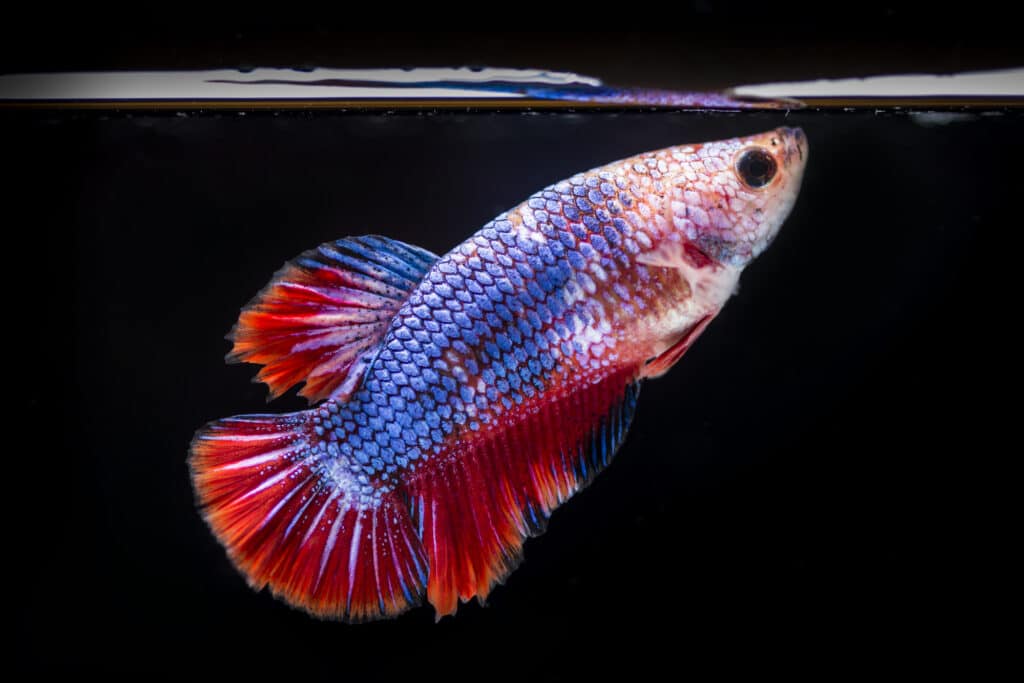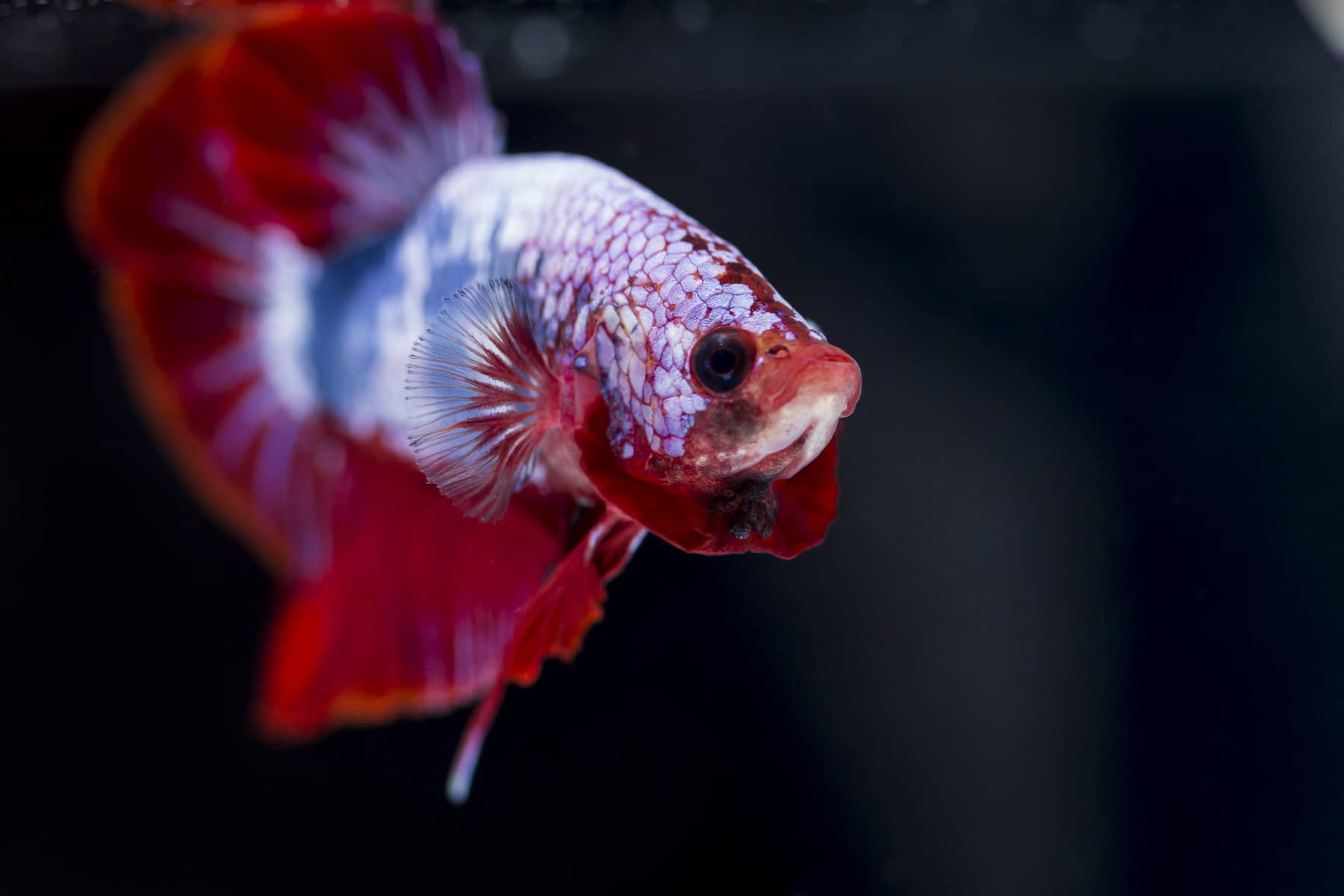Betta fish, or Siamese fighting fish, are beautiful aquarium fish that are popular aquatic pets because of their brilliant colors and extravagant fins and tails.
These tropical fish are diurnal, meaning that, unlike nocturnal animals, bettas are most active during the daytime, resting and sleeping at night.
So, how does your betta cope when you turn out the aquarium lights at night? And can betta fish see in the dark?
Technically, bettas can’t see in the dark any better than we can, but they have an amazing natural ability to overcome that handicap.
In this article, we take a closer look at betta fish vision and explain how your fishy friend manages to “see” in the dark!
The Betta’s Environment
Bettas are native to the slow-moving, murky waters of ditches, ponds, rice paddies, and canals of Thailand, Cambodia, Vietnam, and Laos.
This environment is dark and heavily vegetated, with little to no light penetration. So, bettas have evolved to cope with those conditions.
Betta fish have an excellent sense of smell, enabling them to detect food when conditions are too dark for the fish to sight-hunt. That said, betta fish have excellent eyesight. So, how does that work?
How Do Your Betta’s Eyes Work?
Before we look at how your betta fish copes in dark or dimly lit conditions, it’s helpful to understand how his eyes work.
Can Betta Fish See Color?
Your betta buddy can see pretty much the same range of colors as you, although scientists reckon some of the hues and shades your betta can see differ a little from yours.
However, bettas cannot see the color red, making them technically color-blind. How so?
Although most bettas live in shallow water bodies, some live in deeper ponds or ditches. Every color in the spectrum is on a different wavelength, and water absorbs colors at different rates.
Red is absorbed first, so bettas and other fish living in a deep water dark environment cannot see red.
The Eye Structure
Bettas have amazing eyes that enable them to see both in air and water.
The betta’s eye has an upper air-filled chamber and a water-filled lower chamber. The upper chamber provides the fish with buoyancy and enables it to see above the water’s surface.
Bettas are surface feeders and opportunists, grabbing water-bound insects from the surface, so the ability to see clearly out of the water is essential. The lower chamber is filled with water, enabling the fish to see beneath the waterline.
Both chambers have a different lens system that focuses the light it receives differently. Inside the air chamber is a large lens that strongly refracts light, while the water chamber’s lens is smaller and has a weak refraction capability. The difference in refraction enables the betta to see both in water and air.
Bettas Have 360-degree Vision
Betta fish can see in all directions at once, thanks to what’s commonly referred to as 360-degree vision.
How does that work?
So, betta fish have a “mirror neuron.” That’s a special neuron that enables the fish to see in every direction at once without having to move their eyes. Cool!
The mirror neuron is located in the center of the fish’s brain, where it communicates with the muscles responsible for controlling the eyes. That means the fish can constantly adjust its pupils, taking in light from all angles.
Consequently, your fishy friend has a far wider field of vision than most other fish, which gives him a massive advantage when it comes to searching for food and avoiding predators.
Monocular Vision
Whereas our eyes work in tandem to produce one cohesive image through what we call binocular vision, your betta sees using each eye individually with what’s called monocular vision.
Bettas are diurnal, being most active during the daytime. The retina of diurnal animals has evolved to use more rods than cones to detect colors and provide color vision. As bettas are most active during the day, it makes sense for them to see in this way.
Since they have monocular vision, bettas struggle to see objects at a distance, but their ability to distinguish color compensates for that and is probably better than yours!
Panoramic Vision
Take a closer look at your betta pet, and you’ll see that his eyes are placed on either side of his head rather like a horse’s, giving the fish a panoramic field of vision.
Betta fish are both predators and prey, hunting for much of their food while being viewed as prey for larger fish and water birds.
To hide the betta from prey and hunters, his slim body has scales that reflect sunlight hitting him through the water.
Eye Shape
Unlike your eyes, where the iris can change shape and focus, the betta’s eye cannot be focused.
This means the fish has poor depth perception, which leads to a reliance on natural light, helping to identify what’s around them and locate items of food.
So, when kept in an aquarium, the betta fish needs light to enable it to find food and navigate safely around the tank.
The Iris
The iris is the structure in the eye that controls how much light the eye receives. As mentioned earlier, a betta’s eye is unable to adjust quickly to the degree of light and has a very slow iris functionality compared with yours.
This poor iris function prevents the eye from adjusting quickly to changes in color or ambient light, so your poor betta will be shocked if suddenly exposed to the bright lights of his tank.
For this reason, I recommend that you turn on your room lights for at least 30 minutes before switching on the aquarium lights.
The Lateral Line
In addition to his eyesight, your betta has a kind of “sixth sense” in the form of his lateral line.
Using a magnifying glass, take a look at your beautiful betta fish. Along the fish’s sides are a line of tiny holes in the scales, commonly referred to as the “lateral line.”
The lateral line detects vibrations, movement, and pressure changes in the water around the fish, enabling him to work out the size and proximity of the object, especially if it’s moving. The fish’s brain analyses that information and decides whether to flee from a predator or navigate around an obstruction in his path.
So, while a betta fish doesn’t have true night vision, he uses that amazing sixth sense provided by his lateral line to keep safe and stay out of trouble in complete darkness and the muddy, dark waters of his natural habitat.
Lighting For Betta Fish Aquariums
Bettas can live happily with 8 to 10 hours of regular LED artificial light daily, which is also fine for your aquarium plants.
However, bettas have evolved to live in an environment where the light is poor, and you can save your fishy friend some stress by replicating that in his aquarium.
- Use plenty of lush plants of varying sizes, including floating species, to provide shade and filter out bright light.
- Invest in a lighting unit with a dimmer function that gradually fades the light in and out rather than dazzling your betta when you switch the light on. That replicates a natural sunrise and sunset, perfect for diurnal fish species.
- Before turning on your fish tank light in the morning, turn on the lights in the room first, and leave them on for 30 minutes or so before switching on the aquarium light.
Those tips can help reduce stress for your fish, reducing the likelihood of disease and extending his life expectancy.
FAQs
In this part of our guide to whether betta fish can see in the dark, we answer some of the most commonly asked questions on the subject.
Q: Do Betta Fish Like Being in the Dark?
A: In the wild environment, bettas live in dimly lit, heavily vegetated bodies of water, so you could say that they enjoy a dark natural habitat.
However, betta fish live mostly in the upper part of the water column, where they get lots of natural sunlight.
So, in captivity, you should ensure that your fish gets at least 8 to 10 hours of light per day. At night, you should turn out the tank lights to provide your pet with a suitable environment for sleep and rest.
Q: Is it OK to Leave Betta Fish in the Dark?
A: Betta fish are diurnal creatures most active during daylight hours. When it gets light in the morning, the fish know it’s time to get active, feed, and patrol their territory.
Your pet needs a clear betta fish day-night cycle. Without adequate light and that clear night/day cycle, your fish will become stressed, his bright colors will fade, and he won’t thrive.
So, ideally, you need to provide your betta buddy with 8 to 10 hours of light every day. In addition, your plants need light to photosynthesize, and insufficient light will quickly kill them.
Q: What Do Betta Fish Do at Night?
A: Since betta fish are diurnal creatures, they become inactive when it’s dark, sleeping and resting up after the day’s activity, just as you do!
Q: Are Betta Fish Afraid of the Dark?
A: It’s not thought that betta fish are afraid of the dark. However, my bettas tended to seek out somewhere to take shelter at night when I turned out the tank lights.
In the wild environment, I think the same would happen to protect the betta from nocturnal predators.
Q: Do Betta Fish Need Light at Night?
A: As mentioned above, bettas need darkness at night to enable them to sleep and rest up after a busy day feeding and checking out their territory.
If the aquarium lights are left on 24/7, and the fish is exposed to constant light, the betta won’t get the chance to rest and will become stressed.
So, I recommend that you switch your betta tank lights off when you go to bed and turn them back on in the morning when you feed your fish.
Final Thoughts
I hope you enjoyed our guide to whether betta fish can see in the dark. If you loved it, please take a moment to share the article!
Although betta fish cannot literally see in the dark, they have evolved other physical attributes, such as the lateral line and an excellent sense of smell, that enable them to hunt and avoid predators in a dimly lit environment.
Your betta’s eyes work differently from yours in that his pupils cannot quickly dilate and constrict in response to sudden changes in light. For that reason, you should always turn on the lights in the room where your betta’s tank is located before you switch on the aquarium lights.
What type of betta fish do you have? Tell us about your glamorous pet in the comments box below!

